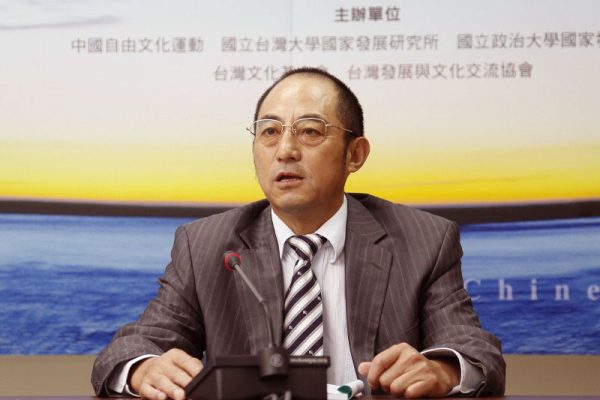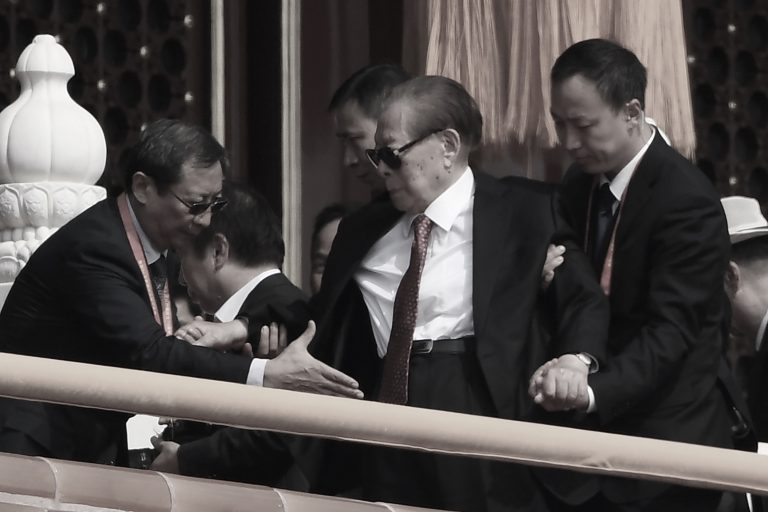Yuan Hongbing, a Chinese dissident and former jurist residing in Australia, shared his views on the pernicious legacy of Jiang Zemin, the Chinese Communist Party (CCP) ex-leader who died in Shanghai on Nov. 30.
Jiang, who was head of state from 1989 to the early 2000s and retained a high degree of control over Chinese politics throughout the 2000s, succumbed to leukemia at the age of 96.
Speaking with the Chinese-language Epoch Times on Dec. 1, Yuan identified Jiang Zemin’s rule as an important catalyst for the degradation of modern China’s rule of law, economic imbalances, human rights violations, and political crisis.
Yuan also observed that Western media and elites expressed sadness at the former leader’s passing, despite Jiang’s misdeeds and his notoriety in the eyes of both the Chinese people and current leadership.
READ MORE
- ‘We Don’t Want the Communist Party’: Chinese Rise Up Against ‘Zero-COVID’ Lockdowns
- Chinese ‘Tuidang’ Movement Counts 400 Million People Who Have Renounced Communism

Typical headlines praised Jiang for presiding over “China’s rise,” and some mainstream commentaries even described him as a reformer. According to SinoInsider, a political risk consultancy specializing in Chinese politics, “Many Western scholars, journalists, and China watchers recalled Jiang as being ‘fun,’ ‘open,’ ‘liberal,” and even reform-minded. Obituaries of Jiang in Western media outlets tended to praise him and condemn [current Chinese regime leader] Xi Jinping.”
Success
You are now signed up for our newsletter
Success
Check your email to complete sign up
Few mainstream observers gave weight to Jiang’s role in expanding the repressive CCP police state or his brutal persecution of Falun Gong, which saw the widespread adoption of forced organ harvesting as a lucrative means of murdering prisoners.
A pernicious legacy
Yuan believes that the positive reception for Jiang in mainstream channels is a result of the extensive business ties between China and the West that were established or strengthened during Jiang’s era of political dominance.
“They are saddened by Jiang Zemin’s death. But their feelings are completely different from those of the Chinese people,” he said.

SinoInsider in a Dec. 1 newsletter described Chinese reactions to Jiang’s death as broadly negative. Internet users blamed the “toad,” as Jiang is popularly nicknamed, for “turning the whole country corrupt,” favoring corrupt officials, keeping a stranglehold on power behind the scenes even after his successor Hu Jintao took office, and as being a “great strategist” in extramarital affairs rather than statecraft.
“From a political standpoint, the way Jiang governed was to have virtually the entire Communist Party officialdom become corrupt through abuse of power,” Yuan said. “This corrupted the institutions of state authority to an unprecedented degree, and this corruption spilled over into the rest of Chinese society at various levels.”
Some Chinese noted following his death that Jiang had curried favor with many foreign leaders. In addition to making business deals and making bombastic fawning displays to Western politicians, Jiang signed off a vast swath of disputed territory to then-Russian President Boris Yeltsin in the 1990s.
“Chinese will not feel any remorse for the death of Jiang Zemin, the leader of the CCP’s tyranny. If they lament, it is only because he could not be brought to justice while he was alive,” Yuan told The Epoch Times.

Overseas Chinese and some in the mainland who circumvented internet controls to comment on foreign social media remarked that the “head of the persecution of Falun Gong” had died and offered consolation to “all persecuted Falun Gong practitioners,” SinoInsider said in its newsletter.
Yuan singled out the persecution of Falun Gong (also known as Falun Dafa) and its estimated 100 million adherents in China as a crowning evil of Jiang’s repression, as well as having played “an extremely bad role” in further moving the entire Chinese society towards greater dictatorship as seen today under Xi Jinping.
‘Moral collapse’
Yuan also blamed Jiang for fostering moral degradation and “soullessness” throughout China, something little-discussed among Western observers.
While Communist China embarked on economic reforms starting in the 1980s, the CCP has retained a paramount role over the political sphere, which in turn plays a dominant role in shaping the economy and society. “The corrupted state institutions [under Jiang] had the effect of encouraging moral vice across China,” he said.
As China’s economy grew, so did the debauchery and decadence of Chinese officials, who colluded with “red capitalists” in illicit business. Prostitution and extramarital affairs became popular — even enviable — AIDS spread throughout the country, and the drug trade skyrocketed.
“In fact, Chinese already arrived at a verdict on Jiang Zemin’s governance by the later period of his time in office. His rule brought Chinese society to the edge of moral collapse. … The whole of Chinese society has become morally nihilist due to the vast corruption and abuse of power that occurred under Jiang,” he lamented.
Even after the Communist Party falls, whoever leads China after it will face the “difficult historical mission” of “China’s future moral reconstruction,” he said.
Hastening the CCP’s downfall
- Reading the Results of China’s 20th Party Congress
- In Leaked Recording, Elite Chinese Scholar Laments Crippling Dysfunction of Communist Regime
Yuan believes that the misrule of Jiang Zemin carried over to Xi Jinping’s decade in power from 2012 to present, and observed intense political struggle between the Xi leadership and the deeply rooted Jiang faction.
While the official Xinhua obituary on Jiang’s legacy was full of flowing praise, Beijing periodically calls to remove the “remaining poison” of corrupt officials associated with the Jiang faction who had been taken down in Xi’s long-term anti-graft campaign.
But Xi’s approach to handling Jiang’s legacy has been to consolidate power and bring the CCP closer to its totalitarian communist roots, Yuan said, adding that Xi uses the style and ideology of founding dictator Mao Zedong to establish authority.
“Xi wants to save the CCP,” Yuan said. “He hopes to revive an older evil [Mao’s legacy] in an attempt to rescue the Party, but in doing so he will only hasten its demise.”















